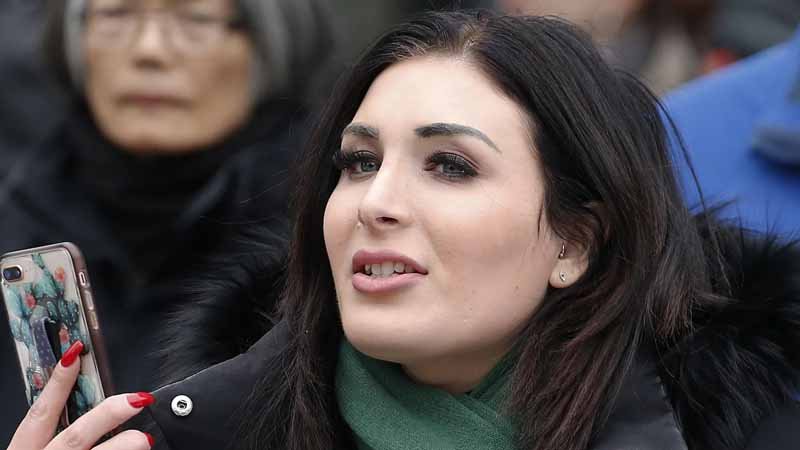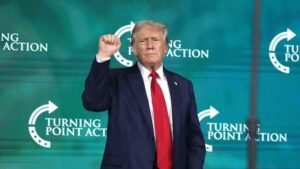
Photo: John Lamparski/Getty Images
Senator Rick Scott (R-FL), currently campaigning for re-election, is facing widespread backlash after promoting his appearance on the podcast of controversial activist Laura Loomer. This move comes just days after he condemned a racist joke aimed at Puerto Ricans, made by comedian Tony Hinchcliffe at a recent rally for former President Donald Trump.
The controversy began when Scott spoke out against Hinchcliffe’s derogatory comment about Puerto Ricans, whom he referred to as coming from a “floating island of garbage.” In response, Scott publicly condemned the remark, saying it was offensive and inappropriate. Yet only days later, he posted a promotional tweet announcing his upcoming appearance on Loomer’s podcast. “Excited to talk about the Senate GOP Leader race soon with [Loomer]!” Scott wrote. “We need Republicans in Washington to act like Republicans again. Looking forward to the conversation!”
The announcement raised immediate concerns from political analysts, journalists, and former colleagues who pointed to Loomer’s reputation for making inflammatory statements and embracing extremist views. Independent journalist Aaron Rupar responded to Scott’s tweet with irony, asking, “Did Alex Jones turn you down or what?”
Loomer has a history of controversial statements and affiliations. The self-described “proud Islamophobe” and supporter of “white nationalism” has been known to promote conspiracy theories around the 9/11 terrorist attacks and the Parkland school shooting. Loomer also sparked outrage within her own party when she made comments about Rep. Ilhan Omar (D-MN), calling her a “black dog” and disparaging Somalis as “inbred” and “low IQ.”
Some prominent voices have expressed concern that Scott’s promotion of his appearance on Loomer’s show suggests a willingness to align himself with her far-right ideology for political gain. Tim Wise, a senior fellow at the African American Policy Forum, criticized Scott, stating, “So Rick Scott condemned the anti-Puerto Rican bigotry at the MSG rally, but is going to appear with Laura Loomer, a self-avowed white nationalist and Islamophobe on her podcast. Let you know Scott’s concerns: it’s not that he minds racism. He just needs Puerto Rican votes.”
Political commentators weren’t the only ones disturbed by Scott’s promotion. Mark Jacob, a former editor at the Chicago Tribune, urged Florida voters to reconsider supporting Scott, backing his Democratic opponent, Debbie Mucarsel-Powell, instead. Jacob stated, “Here’s Republican Sen. Rick Scott legitimizing conspiracy theorist Laura Loomer, who said 9/11 was ‘an inside job’ and suggested the Parkland school shooting was a hoax. Please, Florida. Vote Scott out. Vote Debbie Mucarsel-Powell in.”
Adding fuel to the controversy, Christopher Mathias, a senior reporter at the Huffington Post, noted the timing of Scott’s appearance on Loomer’s show, pointing out that it occurred only 48 hours after he had distanced himself from Hinchcliffe’s comments. Mathias tweeted, “Less than 48 hrs after distancing self from the racist Puerto Rico remark at MSG, Scott promotes Loomer, who calls herself ‘proud Islamophobe’ & ‘pro-white nationalism’ who ‘really does believe in IQ science.’”
Former Trump deputy press secretary Sarah Matthews suggested Scott’s decision to associate with Loomer was a desperate attempt to retain his Senate seat, calling the move “disqualifying.” Matthews tweeted, “Imagine wanting power so badly that you’re willing to debase yourself like this. Feeling the need to kowtow to Laura Loomer is disqualifying for someone seeking to lead the Senate GOP.”
The situation has underscored concerns about the alliances some GOP members are willing to form to gain or maintain influence. With the election fast approaching, Scott’s connection with Loomer could impact his reputation with voters, especially in Florida’s diverse political landscape, where inclusivity remains a critical issue. As public opinion continues to evolve, Scott’s appearance on Loomer’s podcast may spark ongoing debate about the direction of the GOP and the boundaries of political alliances.


